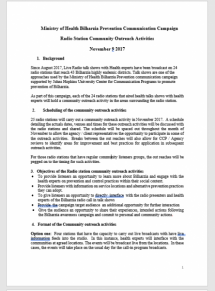Concept Paper for Community Radio Talk Show, Bilharzia Campaign, Uganda
This concept paper describes planned activities as part of a campaign to spread awareness of Bilharzia in Uganda. Starting in August 2017, live radio talk shows with health experts were broadcast on 24 radio stations that reached 43 Bilharzia highly endemic districts. Each of the 24 radio stations that aired health talks shows also held a community outreach activity in the areas surrounding the radio station.
The objectives of the outreach activities were to:
- Provide listeners an opportunity to learn more about Bilharzia and engage with the health experts on prevention and control practices within their social context.
- Provide listeners with information on service locations and alternative prevention practices they can adopt.
- Give listeners an opportunity to directly interface with the radio presenters and health experts of the Bilharzia radio call in talk shows
- Provide the campaign target audience an additional opportunity for further interaction
- Give the audience an opportunity to share their experiences, intended actions following the Bilharzia awareness campaign and commit to personal and community actions.
A Bilharzia quiz was also part of the outreach activities.
Source: Ministry of Heath, Uganda
Date of Publication: March 25, 2019
SIMILIAR RESOURCES
Tools
Examples
- Zika and Pregnancy: Questions and Answers
- Prevention of Sexual Transmission of Zika Virus
- PAHO Urges Countries to Maintain Vaccination during COVID-19 Pandemic
- Community Mosquito Control
- Systematic Literature Review on the Spread of Health-related Misinformation on Social Media
- Zika Communication Network
- Report of the Systematic Review on the Effect of Household Crowding on Health
- Lessons Learned for SBC Programming from the USAID Zika Response
- Strengthening the USAID Zika Response: Experiences from the Zika Social and Behavior Change Working Group
- Social Behavior Change Programming for Public Health Emergencies: Lessons Learned from the USAID Zika Response in Latin America and the Caribbean

